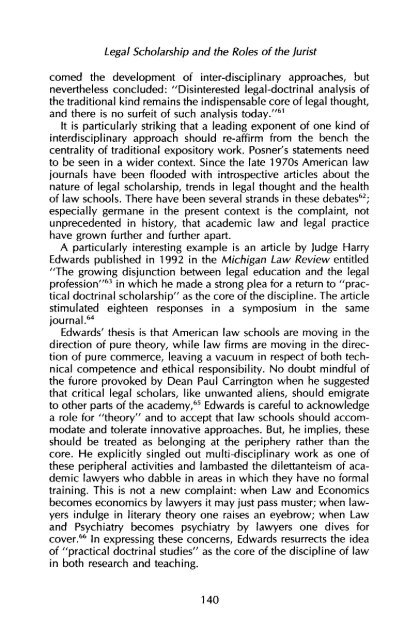Blackstone's Tower: The English Law School - College of Social ...
Blackstone's Tower: The English Law School - College of Social ...
Blackstone's Tower: The English Law School - College of Social ...
Create successful ePaper yourself
Turn your PDF publications into a flip-book with our unique Google optimized e-Paper software.
Legal Scholarship and the Roles <strong>of</strong> the Jurist<br />
corned the development <strong>of</strong> inter-disciplinary approaches, but<br />
nevertheless concluded: "Disinterested legal-doctrinal analysis <strong>of</strong><br />
the traditional kind remains the indispensable core <strong>of</strong> legal thought,<br />
and there is no surfeit <strong>of</strong> such analysis today." 61<br />
It is particularly striking that a leading exponent <strong>of</strong> one kind <strong>of</strong><br />
interdisciplinary approach should re-affirm from the bench the<br />
centrality <strong>of</strong> traditional expository work. Posner's statements need<br />
to be seen in a wider context. Since the late 1970s American law<br />
journals have been flooded with introspective articles about the<br />
nature <strong>of</strong> legal scholarship, trends in legal thought and the health<br />
<strong>of</strong> law schools. <strong>The</strong>re have been several strands in these debates 62 ;<br />
especially germane in the present context is the complaint, not<br />
unprecedented in history, that academic law and legal practice<br />
have grown further and further apart.<br />
A particularly interesting example is an article by Judge Harry<br />
Edwards published in 1992 in the Michigan <strong>Law</strong> Review entitled<br />
"<strong>The</strong> growing disjunction between legal education and the legal<br />
pr<strong>of</strong>ession" 63 in which he made a strong plea for a return to "practical<br />
doctrinal scholarship" as the core <strong>of</strong> the discipline. <strong>The</strong> article<br />
stimulated eighteen responses in a symposium in the same<br />
journal. 64<br />
Edwards' thesis is that American law schools are moving in the<br />
direction <strong>of</strong> pure theory, while law firms are moving in the direction<br />
<strong>of</strong> pure commerce, leaving a vacuum in respect <strong>of</strong> both technical<br />
competence and ethical responsibility. No doubt mindful <strong>of</strong><br />
the furore provoked by Dean Paul Carrington when he suggested<br />
that critical legal scholars, like unwanted aliens, should emigrate<br />
to other parts <strong>of</strong> the academy, 65 Edwards is careful to acknowledge<br />
a role for "theory" and to accept that law schools should accommodate<br />
and tolerate innovative approaches. But, he implies, these<br />
should be treated as belonging at the periphery rather than the<br />
core. He explicitly singled out multi-disciplinary work as one <strong>of</strong><br />
these peripheral activities and lambasted the dilettanteism <strong>of</strong> academic<br />
lawyers who dabble in areas in which they have no formal<br />
training. This is not a new complaint: when <strong>Law</strong> and Economics<br />
becomes economics by lawyers it may just pass muster; when lawyers<br />
indulge in literary theory one raises an eyebrow; when <strong>Law</strong><br />
and Psychiatry becomes psychiatry by lawyers one dives for<br />
cover. 66 In expressing these concerns, Edwards resurrects the idea<br />
<strong>of</strong> "practical doctrinal studies" as the core <strong>of</strong> the discipline <strong>of</strong> law<br />
in both research and teaching.<br />
140

















